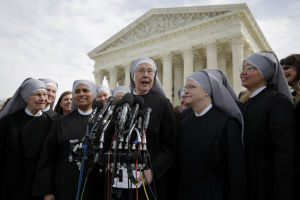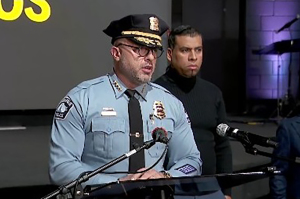It's Not Resurgence We Need But Reformation
A recent article published in The Christian Post addresses an open letter from my friend, Pastor Mark Driscoll, concerning the state of the church today. The letter was originally published on the 2013 Resurgence Conference website. In the letter, Driscoll states, "The church is dying and no one is noticing…" This thought seems to be the premise for Driscoll's additional statements as to why the church is dying, what is needed, and his desire for the conference, itself. In part, Driscoll writes the church is dying because "…we're wasting time criticizing rather than evangelizing."
Perhaps.
Yet stronger resolve, clearer convictions, and/or young Bible-believing, Jesus-following leaders, as Driscoll suggests are needed to counter church decline, will not in my view bring about the resurgence for which he is looking. In fact, it's not resurgence the church needs today but reformation, as I'll explain in a moment.
To be clear, I do not believe the church is dying.1 However, I have no doubt that the local church and its message of God's love for all people has been severely weakened by more than 40 years of misunderstanding and misapplication of what is known as the Homogeneous Unit Principle (HUP).
The original principle suggests that it's easier for people to become Christians when they do not have to cross barriers of race, class or language. Yet in 1972, it was co-opted by church leaders in America and ever since promoted as the modus operandi for those who would plant or grow a "successful" church; i.e., as a strategy for church growth. This fed an all-too-American spirit of independence and competition among church leaders who have ever since measured their success by numbers, dollars and buildings. It's why, still today, the first question most often asked of church planters by network and denominational leaders, alike, is: "Who's your target audience?"
You may be surprised to learn, however, that the HUP was never intended by its progenitor, Donald A. McGavran, as a strategy for reaching believers, or to grow a church in the sense of how we think of it today; but rather as "a strategy to reach unbelievers - a missionary principle."2 Likewise, the term "church growth" was originally applied to a movement seeking to share the Gospel cross-culturally and, consequently, to add new believers to the church through evangelistic efforts overseas.
Sadly, then, misunderstanding and misapplication of the HUP through the years has played right into the natural, all-too-human, desire among pastors for their churches to become real big, real fast: and it works. In other words, target a specific people group: give them the music they desire, the facilities they want, in the neighborhoods they like, etc., and they will come. The fact is, churches do grow fastest when they're homogeneous and soon fill with people of similar ethnic and economic background. But, the question remains, is this really the biblical way? And more pragmatically, is this the real reason the church is not thriving today?
According to the latest research, 86.3 percent of all churches (Catholic and Protestant) are racially segregated, failing to have at least 20 percent diversity within their attending bodies.3 In addition, churches today are ten times more segregated than the neighborhoods in which they reside, and twenty times more segregated than nearby public schools.4 This is in spite of changing demographics and the latest U.S. Census figures that confirm America's continuing evolution into a multicultural nation where no single race or ethnicity represents a numeric majority.5 Surely it breaks the heart of God that so many churches throughout this country remain segregated along ethnic and economic lines and that little has changed in the more than 100 years since it was first observed that 11 o'clock on Sunday morning is the most segregated hour of the week. Brothers and sisters, it should not be so.
As it stands, segmented by race and class, the American Church – the local church – remains a far cry from what Christ envisioned (John 17:20-23), Luke described (Acts 11:19-26; 13:1), and Paul prescribed in the book of Ephesians. To put it bluntly, for far too long institutional racism has been an accepted reality in the church – an unintended consequence of the widespread propagation of a faulty understanding of the HUP.6
While the church may not be dying, it is for this reason perhaps more than any other – namely, local church segregation along ethnic and economic lines – that the church is not thriving in our time. For an increasingly diverse and cynical society is no longer finding credible the message of God's love for all people as it's proclaimed from segregated pulpits and pews.
To be clear, I'm not at all suggesting that individual people or pastors within the American Church are personally biased or, more pointedly, racists. God forbid! Nor am I suggesting that the desire to grow a church quickly is anything less than a desire to reach as many people for Jesus Christ as possible and, thus, to be used greatly, significantly, for His glory throughout our short time on this earth. I, too, share this desire, and value the effort of every well-meaning church planter and pastor, missionary and movement leader alike who is attempting to reach as many people with the gospel as possible in his or her lifetime. But I believe the primary question we should concern ourselves with is not: "How fast can we grow a church?" Rather it should be: "How biblically can we grow a church?"
I have come to understand, then, like Donald McGavran, the principle's progenitor, that the HUP is a valid, biblical, strategy for the purpose of evangelism, discipleship, and leadership development, but a strategy misapplied to church planting, growth and development. If the goal is to evangelize, then by all means target a people group and provide them with the Word of God in their own language. Sing to them in a musical genre they understand, and become incarnate in their culture so that the gospel is expressed through customs, mores, and traditions they readily embrace. But things change once you commit yourself to establishing a local church. You are no longer at liberty to create a congregation of exclusive worshipers - that's just not a biblical option.
Let me be perfectly clear on this point. I'm not arguing against those who would extend the love of God (the Gospel) to people with a similar background. Rather, I am suggesting that nowhere in the New Testament will you find the apostle Paul or anyone else encouraging you to plant, grow or develop a church that is focused on a single people group.
Of course, planting a homogeneous church is something we more readily understand - and something that is much easier to do. Compared with multi-ethnic ministry, it can be a more comfortable experience for everyone involved. But it is not a question of what we want, or what makes us comfortable. Christ expects us to align ourselves and our churches, with His agenda; anything less is unacceptable. In the future, then, I believe we will all need to grow increasingly comfortable with being uncomfortable in order to be more biblical in this regard.
For this reason and more, though I wish Mark Driscoll and the 2013 Resurgence Conference well, I believe the conference to watch on November 5-6 is not the one promoting resurgence, but the one promoting reformation: the 2nd National Multi-ethnic Church Conference in Long Beach, Calif. Indeed, it's this historic conference more than any other that gives me real hope regarding the future of the American Church. In Long Beach, more than sixty thought-leading multi-ethnic church pioneers will be speaking and conducting workshops; an amazingly broad and deep line-up of men and women of diverse ethnic/economic background (60 percent are non-White) and ministry experience. And there's still time to register. For more information, visit www.mosaix2013.com.
Again, in my view, it's not resurgence we need but reformation. Only by returning to the principles and practices of first century churches – in which men and women of diverse ethnic and economic background walked, worked, and worshipped God together as one so that the world would know God's love and believe – can we hope to reach an increasingly diverse and cynical society with a credible witness of God's love for all people. Only then can we reasonably expect the church to thrive in the 21st century.
__________
1 For more concerning the American Church today, see Ed Stetzer: The State of the Church in America. Hint: It's Not Dying. This article can be read at http://www.christianitytoday.com/edstetzer/2013/october/state-of-american-church.html, accessed October 4, 2013.
2 Gary McIntosh. The Life and Minsitry of Donald A. McGavran: A Short Overview. This article can be read at http://churchgrowthnetwork.com/free-resources/2010/05/25/the-life-and-ministry-%09of-donald-a-mcgavran, accessed October 4, 2013.
3 See Scott Thumma: Racial Diversity Increasing in U.S. Congregations. This article can be read at http://www.huffingtonpost.com/scott-thumma-phd/racial-diversity-increasing-in-us-congregations_b_2944470.html, accessed October 4,2013.
4 Statistics presented by Michael O. Emerson at the 1st National Multi-ethnic Church Conference in San Diego, CA, November 2-3, 2010.
5 Ibid.
6 I am using the term as colloquially as defined at http://en.wikipedia.org/wiki/Institutional_racism:
"Institutional racism (also called structural or systemic racism) describes any kind of system of inequality based on race. It can occur in institutions such as public government bodies, private business corporations (such as media outlets), and universities (public and private). The term was coined by Black Power activist Stokely Carmichael in the late 1960s. The definition given by William Macpherson within the report looking into the death of Stephen Lawrence was 'the collective failure of an organization to provide an appropriate and professional service to people because of their color, culture, or ethnic origin,' (Jones, J. M. (1997). Prejudice and Racism (2nd ed.). New York: McGraw-Hill."



























